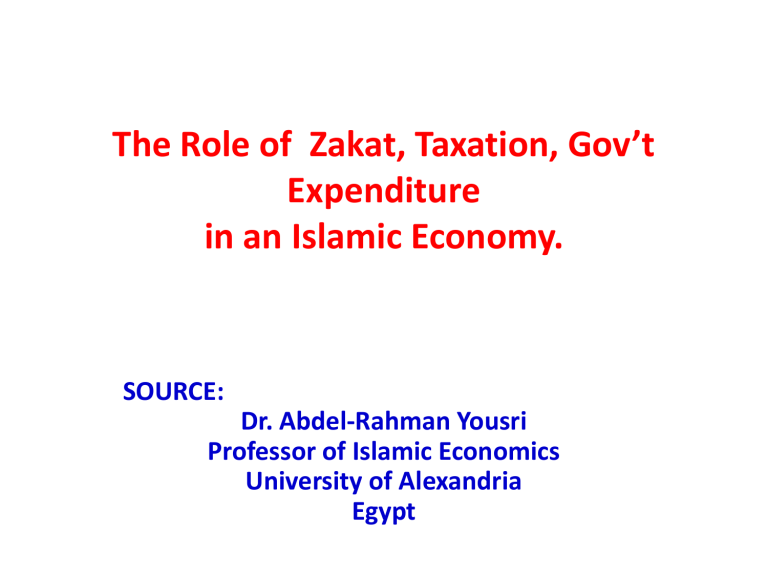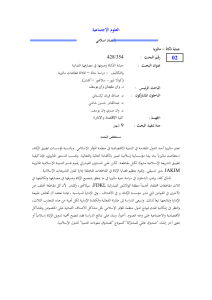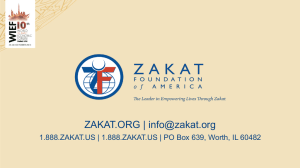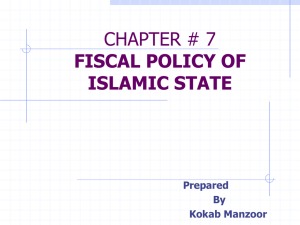
The Role of Zakat, Taxation, Gov’t Expenditure in an Islamic Economy. SOURCE: Dr. Abdel-Rahman Yousri Professor of Islamic Economics University of Alexandria Egypt Functions of the Islamic Fiscal System 1.Collection and distribution of the Islamic fiscal Duty: Zakat FUNCTIONS THE ISLAMIC FISCAL SYSTEM CORE 2.Collection and employment of Non-Zakat revenues: Taxes and other State revenues. 3.Control and Management of Public Property and Resources. 4. Provision and development of Public services and utilities. 5. Estimating need for Public Borrowing If necessary and Management of Public Debt. Zakat Collection And Distribution Non-Zakat Revenues and Expenditure Public Expenditure Zakat Distribution According to Quranic Rules Expenditure according to Shariah and Ijtehad Budget Public Revenues Zakat Revenues Collection according to Sunnah Rules Non-Zakat Revenues (Taxes and other) Collection according to Shariah and Ijtehad The Role of TAXATION Historical View • Only Zakat (the Islamic Fiscal Duty ) was collected from Muslims and no Taxes were imposed on them in the early centuries of the Islamic State. Taxes (Jizyah) were only imposed on non-Muslims because they were not committed to Zakat. • Historical experience reveals that Zakat revenue was in some periods more than sufficient in covering public expenditure, and in other periods insufficient. “Jizyah”, “Kharaj” and “Ushr” • Jizyah was a poll tax imposed on non-Muslim people living in the Islamic state, because these were neither paying Zakat nor serving in the army like Muslim citizens. • Kharaj was a tax levied on arable land owned by non-Muslims in provinces conquered and ruled by the Islamic State. • Kharaj was firstly introduced by the Caliph Umar ibn Al-Khatab after conquering rich agricultural countries such as Iraq, and Egypt. • • • • Ushr A Tax initiated by Caliph Umar ibn al Khatab and was, levied on merchandise brought from outside, once its value reaches Nisab. To Muslims, rate of this Tax was equal to Zakat on trade, i.e. 2.5% on value. Ushr (Zakat) had to be paid to the Asher (Collector of Ushr) on the instant of coming with merchandize from outside. To Christians and the Jews (People of the Holy Book) Ushr was 5% (i.e. double that of Zakat) To Other Merchants coming from countries that were hostile to the Islamic State دار الحرب, Ushr was 10% or equal to rate (s) imposed by these countries on Muslims entering their land with merchandise. Taxation: Defence and Other Purposes • During the Crusades’ military campaigns against Middle Eastern Muslim countries in the 11th - 13th AD Centuries, Muslim Fuqaha issued fatwa pronouncing Shariah permissibility of collecting taxes from Muslims for purposes of Defence. • This fatwa was justifiable by shortage of Public Revenues that were available for defence. • The Rulers in the late period of the Abbasside State as well as during the Ottoman State imposed other Taxes on their subjects( Muslims and non-Muslims) to strengthen the armies. • Taxation became quite burdensome in some periods to the extent of hindering development. (Quote Ibn Khaldun) TAXATION IN A CONTEMPORARY ISLAMIC ECONOMY • Taxation, in Principle, is acceptable within an Islamic economy. • The Role of Zakat as an Islamic source of revenue is fundamental. • Zakat should be the heart of any proposed modern Islamic public revenue System. • Yet, philosophy, targets, and Characters of Zakat should be clearly distinguished. • Rules for Taxes that could be imposed besides Zakat within an Islamic Tax System should be highlighted. Zakat is the Heart of the Islamic Revenue System • Nothing can be said about Taxation in an Islamic system without firstly knowing the nature and role of the Zakat system. • We have to recognize similarities and differences between Taxes and Zakat. i. Just like taxes, Zakat strictly speaking is neither voluntary payment nor a donation and should be collected and distributed by the State (though it could be given directly to its recipients without government intermediation). In Shariah a central treasury ( Beitualmal) is trusted to collect it annually. In recent times, Pakistan, Sudan, and Saudi Arabia have enacted legislation to enforce the Zakat. ii. Zakat unlike taxes which are imposed and enforced through man-made legislations. Zakat is a duty commanded by Allah as part and parcel of religion and, in principle, is a personal exercise intended to purify human soul. iii. The religious aspect of Zakat establishes differences with Secular Taxes in three major areas, namely Tax burden, Tax avoidance and Tax evasion: >> • (a) Tax burden; Tax imposed on producers and sellers is considered part of their costs and a burden which could possibly be transferred to consumers through market mechanism ( depending on elasticity of demand and supply). This is quite different from Zakat, whose payer consider it a religious duty and never a burden and therefore should not be transferred on other people. • (b) Tax avoidance; which is utilization of the tax regime by means that are still within the law (or by exploitation of lope holes in the law,) to one's own advantage in order to minimize the amount of payable tax. A Muslim who knows that he is paying Zakat by order of Allah SW will never do this. On the contrary A believer is normally pleased when his income and wealth are increasing and hence would be paying more Zakat. • (c) Tax evasion; is the general term for efforts by individuals and other entities to evade taxes by illegal means, and this can never be done by any believer. iv. Based on the Islamic conception of justice Only Muslims having Nisab (a set level of income or wealth; money and real assets) are obliged to pay Zakat. On the other hand Zakat revenues are distributed among several categories, with special preference or priority given to the society’s poor and the needy groups. v. In most contemporary developed economies taxation would, to one degree or another, have socio-economic justice amongst its targets. Yet, no special right or priority in Tax revenues is necessarily given to low income groups as in Zakat. vi. On the other hand, historically and in some developing societies socio-economic justice is often missing. a. Historically in non-Islamic societies, e.g. in medieval feudal Europe taxes were collected from ordinary folks in favour of the Nobility and rich landlords. b. In the developing societies taxation is a source of injustice. Taxation imposes more burden on low and middle income groups , e.g. through taxes of regressive rates and through ability of the politicians and rich people to evade taxes by means of corruption. vii. The Islamic system of Zakat enjoys a permanent and stable character. This is unlike secular Taxation where a Tax may be removed or added and its rate is subject to adjustment by Legislators . viii. Whereas Tax rates may be excessively progressive to the extent that they discourage individuals or firms to produce more and earn more income, or may be regressive to the disadvantages of low income groups, Zakat rates are proportional and can be generally described as low or relatively quite moderate when compared with tax rates. The Economic Role of Zakat Zakat which is the core of the Islamic Taxation System has three major Economic Effects : • (a) Distribution Effect, • (b) Income Effect, and • (c) Growth Effect. (a) Distribution Effect • Zakat is collected annually from rich people’s income and wealth and is distributed amongst the poor and needy and other groups which normally need financial support (wayfarer and heavily indebted people). Zakat, therefore, plays a regular and active role in re-distribution of National income and wealth in favour of lower income groups. (b) Income Effect • Private spending of Zakat by recipients whose marginal propensity of consumption is normally high has a direct effect on aggregate demand and National income in the short run. Besides, regular public spending of Zakat on some major items, e.g. National defence has also its direct affect on National income. (c) Growth Effect • Zakat spending on poor and needy should partially be assigned for investment. This kind of investment is necessary for poverty elimination and human resource development in the long run. The larger is Zakat spending that is devoted to investment every year the greater will be the effect of Zakat on growth. Taxation in Islam • The need for imposing Taxes besides Zakat could arise for several reasons. • Public Interest within boundaries of Shariah and its intents may render Taxation necessary for fiscal, economic or non- economic purposes. • Laying Rules for Islamic Taxation is therefore an essential and important task. • The Role of Taxes in an Islamic Economy would naturally be linked and influenced by ethical and Shariah constraints imposed on taxation. Principles and Rules for Islamic Taxation 1. A Tax should not be levied, for any reason, by an Islamic government except after intensive consultation شورىwith eminent Fuqaha and Muslim experts in fiscal and economic matters. 2. Any proposed Taxation should not duplicate Zakat of any type. For example a Tax imposed to provide sustenance to the poor people or to subsidize their necessities would duplicate Zakat : >> Zakat should specifically fulfil this target. In Hadith; “ Allah SW has imposed on rich people a duty (Zakat) to be paid from their amwal (i.e. wealth and income), and this would suffice poor people. If the poor in society should ever face hunger or clothing insufficiency, it would only be due to rich people not fulfilling their duties”. 3. Any proposed Taxation should not contradict the basic principles of the Zakat System. For example no tax should be imposed on low income people or on orphans wealth, or levied at a rate that involves injustice because of its regressive or progressive nature. Taxes should therefore complement and not contradict the Zakat System. 4. A Tax, should never carry or assume the same obligatory and permanent nature of Zakat. A Tax which would be originated for purpose of achieving a given fiscal or economic target (that could not be done by Zakat) has to be removed once this target is done. Otherwise taxation would entail a sinful bedaa ( بدعةorigination of idea or action that changes religion) and injustice.. 5. Taxation with respect to Non-Muslims • All previous principles of taxation are applicable to Muslims. The case of Taxation with respect to NonMuslims requires different treatment. • Non-Muslims will necessarily be subject to taxation because Zakat is not collected from them. • Islamic Shariah provides for treatment of Non-Muslims within framework of Justice and Society’s Public Interest. • Taxes imposed on Non-Muslims in our time have to take into consideration their role in the Islamic economy, benefits they draw from public utilities, their ability to pay and their socio-political obligations.




